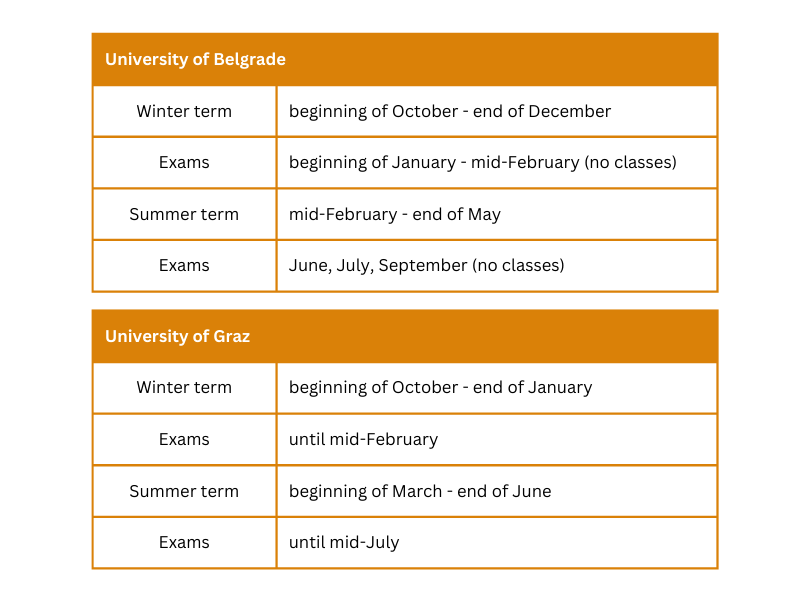The international and interdisciplinary Master's Programme offers two focus areas, one in Southeast European History and one in Law and Politics in Southeast Europe. Students enroll and spend the first year at their chosen entrance university (Graz or Belgrade). Each of the consortium partners offers the compulsory courses that all students must take. The core courses of the first year include introduction to multidisciplinary approaches, seminars in political science and law, history, economics and cultural studies in Southeast Europe.
In the second year, students spend a mandatory mobility semester abroad at one of the partner universities worth at least 30 ECTS credits and specialise in their chosen focus area. In addition, there are optional provisions in place to offer students professional trainings and internship positions.
In the final semester, students write a Master's thesis reflecting their ability to work independently on an academic topic.
All compulsory courses are offered in English, but students can also take courses in other languages. Language acquisition is a key aspect of the Joint Programme and students are encouraged to take courses in a regional language and/or the predominant language of their mobility institution.
Modules and Tracks
The Law and Politics track focuses on the political and legal systems of Southeast Europe, with a particular emphasis on the transformation of the region over the past three decades, including post-Communist democratization, nationalism and ethnic conflict, and Euro-Atlantic Integration, in particular EU accession. While focusing on law and political science, the track takes an interdisciplinary and broad approach in understanding the complex transformation that has characterised the region in recent decades, examining cultural and social change. The law and politics track explores Southeast Europe in a comparative perspective, considering both the variety within the region, as well as in comparison with others.
| Compulsory modules | 45 ECTS |
| Module A. Introduction | 10 |
| Module B. Law and Politics | 20 |
| Module C. Society and Economics | 4 |
| Module D. History | 6 |
| Module E. Summer School | 4 |
| Module F. Privatissimum | 1 |
| Module G. Electives | 40 ECTS |
| Specialisation in law and politics | at least 20 |
| Language course | at least 3 |
| Courses with relevance for Southeast European Area | the remaining ECTS |
| Free electives | 6 ECTS |
| Master's thesis | 25 ECTS |
| Final exam | 4 ECTS |
| Total | 120 ECTS |
The Southeast European History track explores long term historical trends in the region, including the legacy of empires, the emergence of nation-states and the Communist experience. The track explores the cultural and social history of the region, including family and gender relations, cultural transformation and the position of Southeastern Europe in Global history, including migration and other aspects of transnational history.
| Compulsory modules | 45 ECTS |
| Module A. Introduction | 10 |
| Module B. Law and Politics | 6 |
| Module C. Society and Economics | 4 |
| Module D. History | 20 |
| Module E. Summer School | 4 |
| Module F. Privatissimum | 1 |
| Module G. Electives | 40 ECTS |
| Specialisation in history | at least 20 |
| Language course | at least 3 |
| Courses with relevance for Southeast European Area | the remaining ECTS |
| Free electives | 6 ECTS |
| Master's thesis | 25 ECTS |
| Final exam | 4 ECTS |
| Total | 120 ECTS |
The double degree option is open to two students with the University of Graz as their entrance university in the “law and politics” track and an academic background in international relations who are interested in a mobility at the University of Ljubljana.
Upon the successful completion of their studies and the respective double degree track, the selected students will be awarded a Master’s degree on two diplomas, one in Southeast European Studies (University of Graz) and the other one in International Relations (University of Ljubljana).
Criteria for obtaining the double degree:
- Students must complete at least 30 ECTS during their mobility semester at the University of Ljubljana. Follow this link for an overview of compulsory and elective courses.
- Students will enrol both at the University of Graz in Southeast European Studies and at the University of Ljubljana in the Master’s Programme International Relations.
- Students write their Master's thesis in International Relations with a focus on Southeast Europe. Their thesis is jointly supervised by the University of Graz and the University of Ljubljana.
- Students decide at which university they write the Master's thesis. If they decide to write the Master's thesis at the University of Ljubljana, they spend the third and the fourth semester in Ljubljana. The Master’s thesis must be submitted at the University of Graz.
- The defence committee is composed of at least one representative from each university. The thesis is graded according to the grading systems of both universities.
Degree:
Graduates will receive upon successful completion of their studies two degrees:
- Uni Graz: Master of Arts (MA)
- Uni Ljubljana: magister (male grammatical form) or magistrica (female grammatical form) mednarodnih odnosov (mag. medn. odn.)
Mobility
The study programme provides for an integrated mobility semester (30 ECTS credits) as a mandatory requirement for graduation. In the second year, you will spend this mandatory mobility semester at any partner institution in the consortium (except at your entrance university).
Students can indicate priorities of their mobility university according to their academic specialisation during the first semester at their entrance university. However, mobility places will be allocated according to available resources and academic merit of the applicant.
Financial subsidies can be applied for through existing mobility programmes and grants.


Mobility Options
Students with entrance university Belgrade may spend their mobility semester at the following partner university:
- University of Graz, Austria
Students with entrance university Graz may spend their mobility semester depending on their focus area at the following partner universities:
- University of Belgrade, Serbia (Law & Politics)
- Ss. Cyril and Methodius University, Skopje, North Macedonia (Law & Politics)
- University of Bologna, Italy (History / Law & Politics)
- University of Ljubljana, Slovenia (History / Law & Politics*)
- University of Novi Sad, Serbia (History)
- University of Sarajevo, Bosnia and Herzegovina (History / Law & Politics)
- University of Zagreb, Croatia (History / Law & Politics)
- University of Regensburg, Germany (History / Law & Politics)
- Babes-Bolyai University Cluj-Napoca, Romania (History)
- Central European University, Vienna, Austria (History / Law & Politics)
Detailed information can be found in the “Mobility Guide”.
*Double Degree between the University of Graz and the University of Ljubljana for students of the “Law and Politics” track.
Mandatory Mobility
The mandatory mobility semester (3rd semester) is organised by your entrance university. The application for a scholarship within the framework of existing mobility programmes is also made at your entrance university (never at the mobility university). Make sure to stay in touch with your coordinators to apply for your mobility within the prescribed deadlines.
You will be integrated into an incoming student support mechanism at the respective partner university. In addition, you can contact the respective academic coordinator or student advisor for academic guidance. Students in their mobility phase are regarded as regular/regular-equivalent students and will be granted normal access to the facilities of the mobility university.
In order to transfer your grades from one university to another, a conversion table is used.
Additional Mobility
You can complete an additional mobility during the fourth semester. The Master’s thesis can be written in a context of a mobility. However, your supervisor must be from your entrance university. It is also possible to complete an internship abroad. Please clarify in advance whether the internship can be recognized for your degree programme.
Be aware that an additional mobility may lead to a prolongation of your studies, as the 4th semester is normally dedicated to the Master’s thesis.
Additional mobility at the partner university
If you would like to complete an additional mobility semester at the partner university where you spent your mandatory mobility semester, please get in touch with the contact person of the Master’s programme and the respective contact person of the mobility programme at your entrance university.
Additional mobility at another university outside the programme
You can also complete an additional mobility semester at a university outside the Master’s programme. Therefore, you must apply for a semester abroad. Please get in touch with the contact person of your entrance university for further information.


